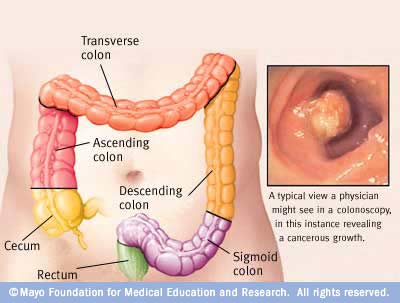November 29, 2015 – Every five years my wife and I both have to have diagnostic colonoscopies because we have had polyps detected in our large intestine. In my wife’s case there is history of intestinal polyps in her family and the existence of polyps could be a precancerous warning.
If you have ever gone through a colonoscopy prep it is a couple of days of “living hell.” But nonetheless having the examination with all of its attendant discomfort is far better than the alternative, dying of colorectal cancer. And yet most people living in North America choose not to get screened despite some dramatic mortality statistics associated with the disease.
- In Canada in 2015, 1 in 14 men and 1 in 16 women are diagnosed with colorectal cancer. That’s approximately 25,000 new cases per year of which 9,300 will die. It is the second most likely cause of death in men and the third in women.
- In the United States there is about a 5% risk of developing colorectal cancer and it is the third leading cause of cancer-related deaths amounting to an anticipated 49,700 in 2015.
- Globally colorectal cancer is the third most commonly diagnosed malignancy with the highest rates in Europe, Oceania, and Korea.
- About 54% of colorectal cancer cases are found in the Developed World.
- Incidence trends in the Developed World, particularly the United States and Canada show a declining trend in colorectal cancer attributed to the finding and removal of intestinal polyps during colonoscopy procedures.
But because traditional screening involves a colonoscopy the majority of Americans and Canadians over age 50 choose not to be screened. Now consider places in the world where the technology and infrastructure to do colonoscopies is non-existent and you have a populations at extreme risk to this form of cancer.
That’s why researchers seeking ways to screen for polyps are trying to find less invasive methods that are more portable and ubiquitous. Among those leading in this effort is Rochester, Minnesota’s Mayo Clinic. Our family visited the Mayo Clinic a number of years ago seeking answers for my daughter’s congenital heart life challenges. The week we spent there changed our lives and today my daughter is 31 and doing well. So when the Mayo comes up with a new test or technology I listen.
For colorectal cancer the Mayo has developed a screening test called Cologuard. It is a kit that can be mailed to your home. It provides instructions for collecting a small stool sample which then gets mailed back for screening. Results are returned within a couple of weeks.
This multimarker screening test detects traces of blood within the intestinal tract as well as DNA alterations to cells in the lining of the colon. There is no prep required, just a stool sample. The results are highly accurate detecting precancerous polyps and early-stage colorectal cancer. The latter detection is really important because Stage 1 5-year survival rates for colorectal cancer are between 87 and 92%.
A Cologuard test doesn’t replace a colonoscopy. If the test comes back positive then prepare yourself for the colonoscopy prep. But a negative result will give you some peace of mind. Cologuard has yet to be used enough for multiple testing staged over years. But in a 10,000 patient clinical study the screening found 92% of colon cancers and 69% of high-risk precancerous polyps. False positives occurred in 13%.
Today Cologuard is approved by the U.S. Food and Drug Administration and also available in the United Kingdom. It’s not in Canada as of yet but should be.
In the absence of Cologuard the recommendations for those at average risk are as follows:
- At age 50 a recommended colonoscopy every 10 years.
- If there is a family history of polyps or colorectal cancer then screening should begin earlier and based on results occur more frequently (I am tested every 5 years because polyps have been detected and removed).
- There is a higher incidence of colorectal cancer among smokers.
- There is a higher incidence associated with a diet high in red meats and non-dairy fats.
- Adding fiber to the diet may reduce the risk of polyps and colorectal cancer.
And don’t be fooled. Early stage colorectal cancer is often asymptomatic so screening may be the only way to find out if you are safe. This is one cancer that all of us can prevent through colonoscopy screening and now it appears using a simple mailed-in stool sample.









